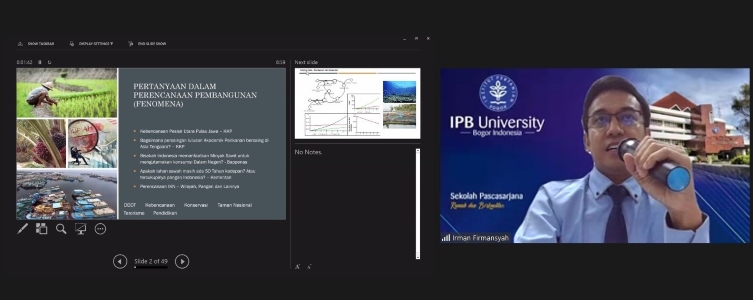EKT IPB University Study Program Holds Public Lectures and Dynamic System Training

The Tropical Marine Economics Study Program (EKT), Faculty of Economics and Management (FEM) IPB University held a Lecture Series and System Dynamic Training. The sixth public lecture series entitled 'Dynamic and Spatial Dynamic Systems for Strengthening Research on Sustainable Marine Economic Management' was held in a hybrid manner. Meanwhile, dynamic system software training took place offline at the Rose Room, Department of Economics and Environmental Resources (ESL), IPB Dramaga Campus, Bogor.
The activity presented a resource person and trainer, Dr Irman Firmansyah. The Head of the Association of Dynamic Systems Experts and Postgraduate Lecturer in Natural Resources and Environmental Management Science IPB University revealed that decision-making with the dynamic system method is very important in the era of Volatility, Uncertainty, Complexity and Ambiguity (VUCA) where changes are very fast, unpredictable, and filled with uncertainty.
"System dynamics is not just for predicting. System dynamics is the art of analyzing graphs or various possibilities to direct and sharpen decision-making in various sectors, including fisheries and marine," he said recently.
The head of EKT IPB University Study Program and moderator of the activity, Dr Kastana Sapanli, explained that tropical marine economies are closely related to system and spatial dynamics. He further said that the concept of marine economics examines various economic activities that are interrelated between land and sea.
"The majority of cities and regions are in coastal areas, so our Indonesian marine potential cannot be underestimated. However, with the contribution of the fisheries and marine sectors below 30 percent, it is certainly an irony whether the calculation technique is not right or its potential has not been empowered," he explained.
Head of the ESL Department of IPB University, Dr Adi Hadianto, hopes that participants will benefit from public lectures and training and can apply them in their respective institutions.
"Every lecturer and researcher must have at least three components that must be mastered, namely communication, network (relations), and soft skills," he hoped.
The dynamic system software training was attended by dozens of IPB University students and lecturers from the EKT and ESL Study Programs, other university community members and government agencies. The activity was presented by assistant Yoga trainers Hepta Gumilar, SPd, MPd and Vidia Mar'atusolihah, SP, MSi.
"The purpose of this training is to train participants in systems thinking so that they can understand basic-level dynamical systems. Thus, participants can apply it to conduct policy analyses, especially to help meet the needs of formulating public policies and strategies in their respective fields or sectors," explained Dr. Adi.
The total duration of the training for 32 hours of material includes Spatial Philosophy, Dynamic Systems and Dynamic Spatial, Introduction and Philosophy of Cellular Automata, and the Application of Dynamic Spatial Policy.
"Hopefully, this public lecture will provide useful new insights, and training can be held again at level 2 with the scope of map/spatial-based dynamic system material," he said.
In the future, the EKT IPB University Study Program will also sign a Memorandum of Agreement (MoA) with the Center Dynamic System to create supporting documents for study program accreditation and as a means of networking for promotion. (Igno/Rz) (IAAS/MZS)


